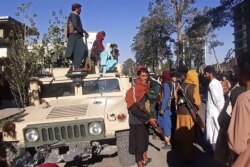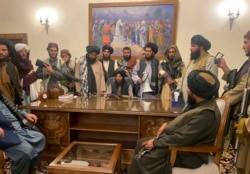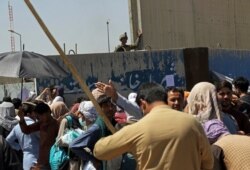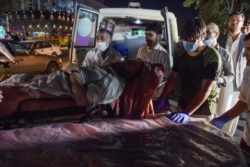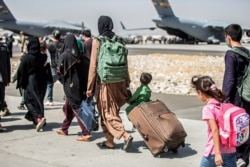A member of the minority Shiite Hazara community, Alireza Ahmadi thrived in the post-Taliban Afghanistan, obtaining a degree from Kabul University and building a successful career as a journalist.
Living in the Afghan capital of Kabul, where he covered security and other issues for Afghanistan-e Ma, one of the country's largest papers, and rode his battered bike to press conferences, Ahmadi was known as something of a free spirit.
But among the members of Ahmadi's historically persecuted community, memories of the Taliban's massacre of Hazaras in the 1990s were still fresh. And with the militants suddenly back in power, Ahmadi was frenetically trying to secure passage out of the country.
On August 26, he was part of the crowd pushing its way into Kabul's airport, where he was supposed to get on an Italian military flight to Rome. But Ahmadi never made it to the aircraft. Instead, he became one of the more than 180 people killed after a suicide bomber detonated his vest.
Friends and colleagues of the 35-year-old journalist described to VOA how, in the days after Kabul fell, Ahmadi's sole focus was on escaping the country.
Taliban take Kabul
His newspaper, Afghanistan-e Ma, closed when the Taliban entered Kabul on August 15. Depressed and sleepless, he spent the next 12 days in his cramped dorm room in western Kabul, firing off emails to anyone who would help him get on an evacuation flight.
"He emailed everyone and contacted every organization, but unfortunately he did not receive an answer," said former journalism school classmate and longtime friend Sayed Ilyas Abdali, an exile in India who chatted with Ahmadi on Telegram the night before the attack.
It's not clear how many groups Ahmadi tried to contact. He was one of thousands of Afghan journalists turning to international organizations, such as New York-based Committee to Protect Journalists, for help fleeing the country.
In August, in just a matter of days, CPJ said, it received thousands of emails and messages, and "Alireza Ahmadi's email was part of that rush of messages from journalists and others, asking for our help."
It was an "extraordinary influx of requests, which only increased in light of a chaotic and dangerous evacuation," CPJ said in a statement to VOA.
One person who did answer Ahmadi's plea for help was Pierluigi Bussi, an Italian freelance journalist and contributor to Italian daily la Repubblica who said he had known Ahmadi for nine years.
They first connected by phone when Bussi traveled on a reporting assignment to Ahmadi's native city of Herat in western Afghanistan, where Italian forces were once stationed as part of NATO's military mission in the country. Ahmadi shot videos and arranged interviews for Bussi. Bussi said they spoke nearly every day, and though they had never met in person, Bussi considered Ahmadi a "great friend."
"I took steps to put him in contact with the Italian authorities," Bussi said in a message to VOA. "He was among the people who were supposed to leave on the plane flight to Italy" on August 26.
"I tried to do everything possible to help him," Bussi added. "I also believed that he could be saved. But he couldn't live. I will always carry it in my heart."
Three days after the fall of Kabul, Bussi published a Q&A with Ahmadi in la Repubblica, giving him a platform to voice his fears and anxieties about the Taliban takeover. The Taliban claimed to have softened their policies, promising to respect women's and minority rights and protect a free press. But Ahmadi wasn't buying any of that.
"They want us dead," Ahmadi said in the interview with Bussi. "For them, we are infidels. I ask for help from Italy."
Hazara refugees in Iran
Like millions of Afghans, Ahmadi and his four younger siblings grew up in Iran, refugees from the Soviet occupation of Afghanistan that lasted from 1979 to 1989. They stayed on in the 1990s as the Taliban's emergence and harsh treatment of Hazaras unleashed a new flood of refugees into Iran.
But life in Iran was far from ideal for the Hazara refugees. Though Shiite by religion, many Hazaras, with their distinct Asiatic features, suffered discrimination, their children unable to attend college.
And so, when the U.S. drove the Taliban from power after the attacks of September 11, many Hazara refugees returned to Afghanistan, lured by newfound freedoms and opportunities under the country's fledgling democracy.
In 2004, the Ahmadi family joined the returnee wave. Ahmadi's father, a former army soldier with a third-grade education, was eager for his five children to get college degrees, according to Ahmadi's brother Mustafa Ahmadi, who lives in Herat.
"One of the reasons many Afghan families decided to move back was because their children couldn't attend university in Iran," Mustafa Ahmadi said in an interview with VOA.
Ahmadi enrolled in Kabul University's Faculty of Journalism in 2010, eager to get a job in the country's vibrant media sector, at the time considered one of the freest in the region.
Alireza Ahmadi, pictured here in an undated photo at an unidentified location, is seen at a news event during his earlier years as a reporter.
His first gig out of college was with Ava Press, one of dozens of media outlets funded in recent decades by Afghan Shiite businessmen, politicians and religious leaders.
Although detractors accused the Shiite-owned media organizations of adding to ethnic and religious tensions in the country, defenders say they helped create jobs and fill a coverage vacuum.
"The non-Shiite media did not cover Shiite religious ceremonies and events. Only the Shiite media did, and this helped put the spotlight on Shiite Afghans," said Abdul Bari Khalili, editor in chief of Roushd News Agency, which is funded by a Shiite businessman.
After stints at several other outlets, Ahmadi landed at Afghanistan-e Ma, a national newspaper linked to a prominent Hazara politician, Sarwar Danish, who served as former Afghan President Ashraf Ghani's second vice president. Working as a reporter and news editor, he wrote about the environment and covered the insurgency and suicide attacks in Kabul.
"Whenever there was a terror attack, he'd say, 'If I get caught up in an attack, I hope I die and not become disabled,'" college classmate Abdali recalled.
Ahmadi's interests ranged widely. An avid soccer fan, he idolized Lionel Messi and never missed a Barcelona game, according to friends. Once or twice a week, he joined friends for a game of indoor futsal. Bussi says Ahmadi loved Italy and dreamed about vacationing in Europe.
"He talked to me about Sardinia and Formentera," Bussi wrote in la Repubblica. "He loved the colors of the beaches. He loved the cities of art. He loved football."
As the Taliban advanced in early August, Ahmadi began to worry about his future and safety. When his native Herat fell to the Taliban on August 12, he called his brother Mustafa to check up on the family. He had had heard reports that Taliban forces were taking women as sex slaves, and he worried about his sister, who had recently started working as a journalist.
"I told him things are looking bad here and asked him what we should do," Mustafa recalled. "He thought it might be a good idea if the family moved to Kabul."
The family never got the chance. Within three days, Kabul was in Taliban hands.
Trying to leave
Bussi said that he could confirm only that "Alireza was among the people who would have had the opportunity to get on the plane" to Rome.
"He asked Italy for help because I was a great friend of him and I was Italian," Bussi said.
The Italian embassy in Kabul, slated to move to Doha, Qatar, did not respond to emailed questions about whether Ahmadi had been booked on an Italian military flight out of Kabul.
The day before the attack, Ahmadi, apparently in anticipation of his flight out of the country, announced on Facebook that he had "sold about 60 books for 50 Afghanis (70 cents)." When a friend commented that it appeared Ahmadi was leaving the country, he responded, "Yes, for a while."
Bussi and Khalili recalled talking to Ahmadi around noon the next day. Ahmadi had arrived at the airport with his younger brother Mojtaba, who had unsuccessfully attempted to enter the airport several days earlier, according to Mustafa Ahmadi.
"I gave him my location, but he couldn't make his way through the massive crowd to where I was standing," said Khalili, who had been outside the airport at the time.
Ahmadi's phone went dead, he said. Then came the explosion around 6 p.m. At least 180 people, including 13 U.S. servicemen, were killed in the attack claimed by the Islamic State terror group. In addition to Ahmadi, Najma Sadeqi, an Afghan TV presenter, was among the dead, according to the Afghanistan Journalists Center.
The last Italian Air Force evacuation flight left Kabul on August 27, and Italy announced that it had airlifted nearly 5,000 Afghan nationals. It did not say whether any journalists were among them.
The following day, Mustafa Ahmadi, having traveled to Kabul from Herat, found his brother's body in a Kabul hospital morgue. Ahmadi's face was barely recognizable, and Mustafa Ahmadi said he identified him by his arms. Lean and tough, Alireza always beat him at arm wrestling.
The body of the younger brother, Mojtaba, was found nearly two weeks after the attack.
The U.S. and its allies flew more than 123,000 civilians out of Afghanistan in August, among them, many journalists and civil society activists.
Veteran Afghan journalist Murtaza Meraj said the Taliban's return to power threatens to upend all that the Hazara people achieved over the past two decades.
"In a climate of fear and terror, not only can the Hazaras no longer advance but they will be forced into exile," Meraj, who was evacuated to Albania, said. "More than anyone else, the educated classes and the political, intellectual and cultural elites face a great danger."
"Alireza was one of these motivated and hardworking journalists," Meraj added. "He learned, he grew and, with his lofty dreams still unrealized, he fell victim to a terrorist attack."






